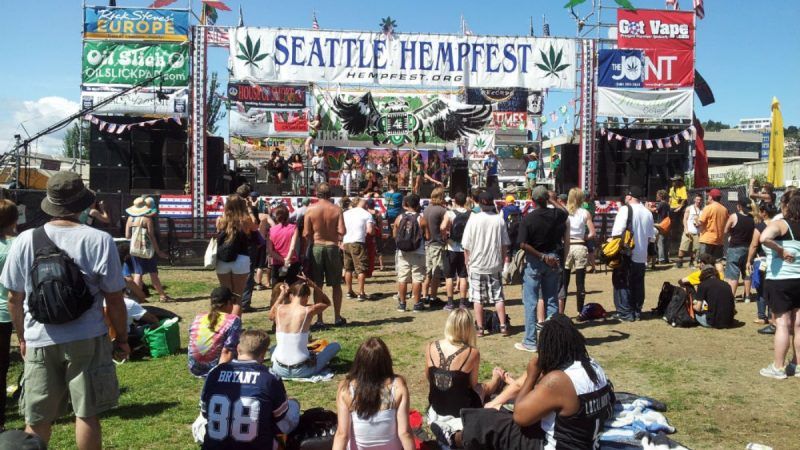Facing Legal Challenge, Washington Weed Regulators Lift Ban on Cannabusiness Signs at Seattle Hempfest
The state's Liquor and Cannabis Board changed its policy after Hempfest and two marijuana retailers challenged it on constitutional grounds.

Washington regulators yesterday lifted a ban on signs referring to state-licensed marijuana businesses at Hempfest, the massive summer "protestival" that has been held in Seattle every summer for the last 27 years. The decision by the Washington State Liquor and Cannabis Board (WSLCB) came three weeks after Hempfest and two cannabis retailers filed a lawsuit arguing that the ban violated their rights to freedom of speech, freedom of assembly, and freedom to petition for redress of grievances under both the First Amendment and the state constitution.
The Seattle Times reports that the WSLCB consulted with the state Attorney General's Office before announcing that Hempfest sponsors may, as usual, display their names and distribute information at the event, provided they limit themselves to "noncommercial" activity. Instead of acknowledging the reversal, the board is framing it as a clarification of the policy described in an April 17 bulletin that said "a marijuana licensee in the state of Washington cannot have any sign or advertisement at any event, if the event is located at or within 1,000 feet of one of the listed restricted areas," which include public parks.
Hempfest, which is scheduled for August 16 through 18 and in recent years has attracted about 100,000 people annually, is held in Seattle's Myrtle Edwards Park and Centennial Park. In their June 4 lawsuit challenging the WSLCB's decree, the event's organizers complained that the new sign rule had made cannabusinesses reluctant to participate in Hempfest.
"After hearing from and working with stakeholders in the licensee community, WSLCB understood that Bulletin 19-01 did not fully answer all of the licensees' questions and raised some additional concerns," the board says in a bulletin published yesterday. "Accordingly, this Bulletin clarifies and supersedes Bulletin 19-01." The WSLCB now wants licensees to know that "educational, informational or advocacy literature and/or signs which incorporate a licensee's business trade name at events held within 1000' of restricted entities will not be considered advertising, so long as that signage, sponsorship, and literature is non-commercial in nature, e.g., does not involve the solicitation of business, descriptions of products sold at stores, [or] lists of products sold, or refer to prices of products."
Seattle Hempfest director Vivian McPeak welcomed the board's shift. "We applaud the Attorney General's Office for observing the free speech of licensed cannabis businesses to engage in noncommercial messaging at public events," he told the Times. "We look forward to hosting those businesses as sponsors or vendors at Hempfest this year, and we invite their participation at the festival."
